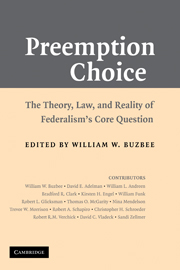Book contents
- Frontmatter
- Contents
- Contributors
- Acknowledgments
- Introduction
- Part I FEDERALISM THEORY, HISTORY, AND PREEMPTION VARIABLES
- Part II THE LAYERED GOVERNMENT NORM
- Part III JUDICIAL TREATMENT AND INTERPRETIVE CHOICE
- 6 Supreme Court Preemption Doctrine
- 7 When Congress Goes Unheard: Savings Clauses' Rocky Judicial Reception
- 8 Federal Preemption by Inaction
- 9 Process-Based Preemption
- 10 Preemption by Federal Agency Action
- Part IV PREEMPTION TALES FROM THE FIELD
- Index
10 - Preemption by Federal Agency Action
Published online by Cambridge University Press: 07 July 2009
- Frontmatter
- Contents
- Contributors
- Acknowledgments
- Introduction
- Part I FEDERALISM THEORY, HISTORY, AND PREEMPTION VARIABLES
- Part II THE LAYERED GOVERNMENT NORM
- Part III JUDICIAL TREATMENT AND INTERPRETIVE CHOICE
- 6 Supreme Court Preemption Doctrine
- 7 When Congress Goes Unheard: Savings Clauses' Rocky Judicial Reception
- 8 Federal Preemption by Inaction
- 9 Process-Based Preemption
- 10 Preemption by Federal Agency Action
- Part IV PREEMPTION TALES FROM THE FIELD
- Index
Summary
Although preemption questions often occur in contexts unrelated to federal agency action, preemption has also occurred as a result of federal agency action since at least Gibbons v. Ogden. In Gibbons, the first Supreme Court case to assess the extent of the Commerce Clause of the Constitution, the Court held that a license to engage in the coastal trade given to Ogden by a federal agency preempted the New York law granting a monopoly to Gibbons for the use of steamboats in New York.
Today, as a result of the growth of the administrative state, most preemption questions involve federal agencies in some way. Most recently, the failure of the Republican Congress to enact meaningful tort reform at the national level led the Bush administration to attempt to achieve similar ends by preempting state tort law through administrative actions. Increasingly, federal agencies in regulations, preambles to regulations, or amicus briefs are purporting to decide whether their regulations (or their failure to regulate) preempt state common law tort actions. The Food and Drug Administration (FDA) has received the most press on this issue, having filed amicus briefs in several tort cases supporting industry claims of preemption as well as asserting in a preamble to a regulation that the regulation preempted certain state tort law. Other agencies have taken similar actions.
- Type
- Chapter
- Information
- Preemption ChoiceThe Theory, Law, and Reality of Federalism's Core Question, pp. 214 - 232Publisher: Cambridge University PressPrint publication year: 2008
- 1
- Cited by

